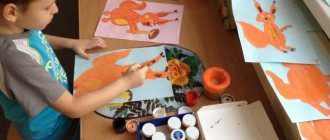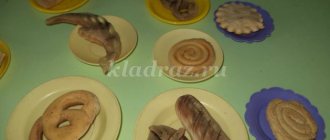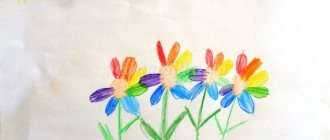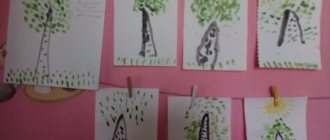Summary of a psychologist's lesson in the middle group “Becoming kinder, becoming smarter!”
Summary of an integrated lesson in the middle group “Becoming kinder, becoming smarter!”
Audience : children of the middle group 4-5 years old.
Format : subgroup, 6-7 people.
Goal: learning skills for interacting with peers
Objectives: - developing a sense of empathy with a friend; — prevention of destructive behavior; - memory development; - development of attention; - development of fine motor skills of the hands. Equipment: chairs according to the number of children, plastic flower, A4 paper or landscape sheets, colored pencils, 6 soft toys
Progress. Acquaintance. Teacher-psychologist: “Hello guys! I'm glad to see you! I have a beautiful flower in my hands. This flower will be in the hands of everyone. We will pass it to the one on the left and wish him a good day.” The children take turns passing the flower to each other with a wish.
Exercise “Gift for the guys” Teacher-psychologist: “I invite you guys to sit down at the tables. And let each of you draw a gift that he would like to give to the children who are here now.” After the children have drawn the drawings, all the children are invited to sit in a circle on chairs and the teacher-psychologist shows each drawing to the other children.
Exercise: “Remember the animals” (goal: development of attention, memory) The teacher-psychologist puts 6 soft animal toys on the table. Teacher-psychologist: “Guys, look what wonderful animals came to visit us. Let's look at them carefully and try to remember them." Children look at toys for 30 seconds and remember. “Now kids, please close your eyes.” Children close their eyes, at this time the teacher-psychologist removes 1 toy, the children open their eyes and begin to remember which one is missing. Thus, the educational psychologist removes one toy 4 times and asks to remember which toy is missing, only the next time he gives 10 seconds to remember
Finger gymnastics: “Bunnies in the forest” (goal: development of fine motor skills of the hands). The teacher-psychologist reads the poem slowly and shows hand movements and asks the children to repeat these movements. The bunnies were jumping on the lawn (they tap their fingers on their knees)
And suddenly the hares saw the fox (they walk on the knee with two fingers)
Jump, jump into the woods, (they tap the knee with their fingers again)
They hid there under an oak tree! (fingers clenched into fists)
Exercise "Let's become kinder." Teacher-psychologist: “Guys, now let each of you figure out what needs to be done in order to become kinder.” Children think for a few minutes. After this, the educational psychologist asks each child in turn for a sentence and writes it down on a sheet of A4 paper. Teacher-psychologist: “You guys came up with some very interesting suggestions, I wrote them all down, we will put them in the group so that we don’t forget them.
Parting. Teacher-psychologist: “This ends our lesson guys, let’s blow each other a kiss and say “See you later” to each other! A teacher-psychologist reads a poem: “I’m very glad that I met you, Your smiles are like a ray of sunshine. You become kinder and more joyful, and remove all the evil in yourself to the bottom!
Appendix 1. Stimulus material:
Title: Summary of a psychologist’s lesson in the middle group “Becoming kinder, becoming smarter!” Author: Kuzmina Oksana Aleksandrovna Position: teacher-psychologist Place of work: MDOU kindergarten “Solnyshko” Location: Ulyanovsk region, Surskoe settlement
Also interesting work: Notes from a psychologist’s lesson in the middle group “Crocodile visiting children”
Date modified: 12/10/2020
MAGAZINE Preschooler.RF
Target: Forming a sense of community in children, developing a friendly attitude towards each other. Developing a sense of community, tolerance for people who are not similar to us in appearance. Development of communication skills. Materials: toy character Lesovichok, Little Fox, album sheets, paints, pencils, felt-tip pens. Progress of the lesson: Psychologist: Hello guys! Today we are going on a trip to a fairy forest to visit our friend Lesovich. (Children listen to the sounds of the forest with their eyes closed) Welcome Ritual Psychologist: “Imagine that you are in a fairy forest. Take a look around. Birds sing, butterflies fly, beautiful flowers grow. The sun shines brightly. You feel the soft green lush grass under your feet. Breathe in the fresh air, the aroma of nature, listen to the sounds. You feel good and comfortable.Here we are in a fairy forest. And here is our Lesovichok. Lesovichok: Hello, guys! Do you know yourself well? Let's check and play the game. Everyone sit down on the chairs, as soon as you hear the command and find it in your place, you will have to complete the task. For example: Let everyone who is in a good mood today stand on their right leg. Let everyone with brown eyes clap their hands. Let everyone who has something pink in their clothes touch the tip of their nose. Let everyone who never offends others pat themselves on the head. Let everyone who knows how to help children and adults smile. Let those who do not call others names clap their hands. Lesovichok: Listen to one fairy tale from our forest.
Working with the fairy tale “Short-legged Fox”
One day in the forest, a small fox cub was born to a family of fox cubs; it differed from other fox cubs in that the tail was not fluffy, the paw was shorter than the other. The little fox grew up alone. Nobody wanted to be friends with him. After all, he was not like everyone else. They called him “Short-legged” And when all the forest animals gathered in the forest clearing, he sat and cried alone. But one day a little fox was walking through the forest, when he suddenly noticed that a squirrel who wanted to jump on a branch had fallen. The little fox immediately ran to the rescue. He helped the squirrel get home. He reported on the forest radio for help. Since then, the animals have become friends with the little fox. They stopped calling him names and were proud that they had such a friend. And if he needed help, they helped. Discussion: -Why didn’t the animals want to play with the little fox? -How did the little fox feel? Psychologist: Guys, there are people whose eyesight is poor, their ears cannot hear, their legs hurt - they have poor health. You and I have many opportunities - to see, to hear, to walk, to play, to do something with our own hands. But these people do not have such opportunities. These are people with disabilities. How can we help them? We’ll help them cross the road, carry their bag, push their stroller. We must treat these people with respect, as in our fairy tale. How can you be sorry? Children, do you always have fun? Sometimes everyone feels bad, someone offended you, you hurt yourself and, probably, you really want someone to take pity on you. Likewise, another child or adult, when he feels bad, wants to be pitied. Let's talk about how you can feel sorry and console. How does your mother feel sorry for you? What can you say to a person to calm him down? What can be done? How will you behave if your mother has a headache? What if your sister or brother gets hurt? What if your cat or dog is sick? Why can a person feel bad? Will you be equally sorry in all cases? Children, even if you are in a hurry, you are having fun, then be sure to take pity on the one who is feeling bad and in pain. Do as you would like to be treated. Do good to people and it will come back to you. Let's play a game with you too. I will blindfold one child. And the second one, taking him by the hand, should lead him along the forest route. The game is played until all the children are in different roles. Discussion: -It was difficult to lead another person. -Was it difficult to walk blindfolded? Lesovichok: Guys, are you beautiful? A handsome man, what kind of man is this? We have a beauty ring in the forest. As soon as you point the ring at any person, all the most beautiful things in him immediately become visible. Children stand in a circle and extend their folded palms forward. The psychologist discreetly places a ring in someone’s hands. Then the children shout in unison: “Ring, ring, go out onto the porch.” The person who receives the ring runs out to the middle of the circle. He should touch his friends with the ring and tell him what beautiful things he sees in them. Now let's draw our little fox. Think about how you can portray him and his friends. Lesovichok: Well done! You brought the fairy tale to life with your drawings. Psychologist: Guys, it’s time for us to return from the fairytale forest. I see you found it interesting and fun. We say goodbye to our hero Lesovichok. But you and I will visit the forest more than once (children close their eyes). While you are still in the fairy forest. But suddenly you saw a path. You say goodbye to the magical forest and walk along the path back to our group. Ritual of farewell. Everyone stands together in a circle, extends their left hand forward “from the heart, from the soul” (it turns out to be a pyramid of palms) and says the traditional words: “One, two, three, four, five - we’ll meet again soon!”
Ustinova N.V. Teacher-psychologist - first category. CPPRi K "Satoris" Republic of Bashkortostan. Ufa
| Next > |
"We are so different."
Cheredina Irina Vladimirovna – psychologist
KSU "Osh No. 132" Atasu village, Zhanaarkinsky district, Karaganda region, Kazakhstan
Psychological lesson “We are so different...” 8th grade
Target:
To promote a sense of respect for each other, mutual assistance, team unity, and develop creative activity.
Tasks:
- Foster a sense of respect for everyone’s personality;
- Contribute to the formation of an atmosphere of friendship, mutual understanding and support in the classroom team
- Develop the ability to show positive emotions, sympathy, and the need to communicate with each other.
Equipment:
cards, reminders, posters, felt-tip pens, markers.
Progress of the lesson:
Greetings
Warm-up: Name and fruit
(everyone says their name and favorite fruit)
Parable
: "We are so different…"
The Student came to the Teacher and began to complain. Naturally, for your hard life. I asked the Teacher for advice on what to do when one thing came up, and another, and a third, and in general, I just gave up! The teacher, silently, stood up and placed four pots of water in front of him. He threw a wooden block into one, a carrot into another, an egg into the third, and crushed coffee beans into the fourth. After a while, he took what he threw out of the water. - What changed? – asked the Teacher. Nothing... - answered the Student. The teacher nodded silently and put these four pots of water on the fire. When the water boiled, he again threw a wooden block into one, a carrot into another, an egg into the third, and crushed coffee beans into the fourth. After a while, he took out a piece of wood, a carrot, an egg and poured aromatic coffee into a cup. The student, naturally, again did not understand anything. - What changed? – the Teacher asked again. What was supposed to happen. The carrot and egg were boiled, the piece of wood remained unchanged, and the coffee beans dissolved in boiling water,” answered the Student. “This is only a superficial look at things,” answered the Teacher. Take a closer look: The carrots were boiled in water and turned from hard to soft and easily broken. Even outwardly she began to look different. The piece of wood hasn't changed at all. The egg, without changing externally, became hard inside, and it was no longer afraid of the blows from which it had previously... flowed out of its shell. Coffee colored the water, gave it a new taste and aroma - Water is our life. Fire is change and unfavorable circumstances. Carrot, tree, egg and coffee are types of people. They all change differently in difficult moments of life.
1. Carrot Man: almost half of all people are like this. These people only seem firm in everyday life. In moments of troubles in life, they become soft and slippery. They give up and blame everything either on others or on insurmountable external circumstances. It pressed down a little and... they were already in a panic, psychologically crushed. Such “carrots”, as a rule, easily become victims of fashion; they want “everything to be theirs, like people’s”; it is from them that successful traders, politicians and… make their fortunes. 2. Tree Man: there are slightly fewer of these than the first. These people do not change, they remain themselves in any life situations. They are, as a rule, cold-blooded, internally calm and integral, or something. It is these people who show everyone that difficult life circumstances are just life, and after a black streak there is always a white one. 3. Egg people are those whom life’s adversities temper and make stronger! There are few such people. It is precisely such people who are nothing in ordinary life, but in difficult times they suddenly “harden” and stubbornly overcome external circumstances. 4. -What about coffee? - exclaimed the Student. -Oh – this is the most interesting! Under the influence of unfavorable life circumstances, coffee beans dissolve in the environment, turning tasteless water into a tasty, aromatic and invigorating drink! – answered the Teacher, happily sipping aromatic coffee from a cup. There are special people. There are only a few of them out of every hundred. They do not change so much under the influence of unfavorable circumstances as they change the life circumstances themselves. They change established old outdated ideas, changing or replacing them into something beautiful. Taking advantage of an unfavorable situation and changing the lives of all the people around: friends for the better, enemies and irresponsible ones... as always, everything should be in moderation... sometimes for them this means: operating at the limit, at the limit that their friends can withstand, or real best friends. And this... they respect responsible people, people who value the Truth, who respect the rights of others, because that’s who they are.
The topic of our lesson today is “We are so different...”
Conversation:
- What are we like? (list the qualities, characteristics of a person that make us special)
- Which qualities do we consider positive and which negative?
Exercise:
Fill out the table (students fill out and then compare with the correct answers)
| Signs | Unsure man | Rude man | Confident man |
| Sight | Averts eyes, avoids direct gaze | A defiant look, sometimes sullenly or from above | Direct, interested look |
| Pose | Shoulders slumped, tries to take up less space, sits on the edge of a chair | Shoulders turned, elbows protruding, knees spread, takes up a lot of space | The pose is natural, appropriate situation |
| Gestures | Gestures are small, fussy or slow, as if unfinished, may fiddle with fingers | Gestures are sharp, sweeping, as if exaggerated. In a cramped room, something can break or spill | Calm, smooth, no unnecessary unnecessary movements |
| Voice | Quiet, childish intonation | Deliberately loud, rough intonations | Calm, friendly intonations |
| Particularly speech skills | Begs, ingratiates, tries to pity | Threatens, insolent, insults | Expresses serious arguments, provides facts |
Game "Australian Rain"
Target
: provide psychological relief for the participants.
Participants stand in a circle. Instructions: Do you know what Australian rain is? No? Then let's listen together to what he is like. Now in a circle in a chain you will convey my movements. As soon as they get back to me, I will pass on the next ones. Watch carefully!
- The wind picked up in Australia. (The leader rubs his palms).
- It starts to rain. (Snapping fingers).
- The rain is getting heavier. (Alternate clapping of palms on the chest).
- A real downpour begins. (Clap on thighs).
- And here comes the hail - a real storm. (Stamping feet).
- But what is it? The storm subsides. (Clap on thighs).
- The rain is subsiding. (Clapping palms on chest).
- Rare drops fall to the ground. (Snapping fingers).
- The quiet rustle of the wind. (rubbing palms).
- Sun! (Hands up).
Issues for discussion:
- Was it easy for you to do this exercise?
- Did you get confused while completing tasks?
- What are your impressions of the exercise?
Creative task
: Work in groups.
Depict the association on posters
- uncertainty,
- rudeness,
- confidence
with a plant, animal or any object.
Presentation and discussion.
Lesson reminder (
distribute, read, discuss
)
“How to maintain friendly relations”
- show interest in your friend's concerns and hobbies
- If conflict situations arise, try to resolve them together
- do not give advice, but help your friend find a solution - know how to defend your own interests
- His name means a lot to a person. Nicknames and offensive nicknames are not the best way to maintain friendship
- if you want to be understood, explain
- Unfortunately, we often make mistakes when trying to understand each other's thoughts and feelings. Feel free to ask again and clarify
-Express your feelings openly, but try to avoid judgment. Do not try to evaluate all words and actions only as “good” and “bad”
- remember, two people see the same situation from different points of view. They may perceive it completely differently, each may be right in their own way.
Summarizing:
My opinion... (statements from students)
Reflection:
Symbolic (cards of different colors)
Thank you for your participation!!!







